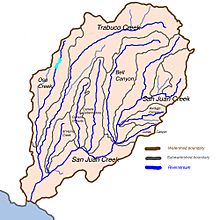El Horno Creek facts for kids
El Horno Creek (also called Horno Creek) is a small stream in Orange County, California. Its name comes from the Spanish words for "Oven Creek." It's a tributary, which means it's a smaller stream that flows into a larger one. El Horno Creek flows into San Juan Creek.
This creek is about 5.9 miles (9.5 kilometers) long. It collects water from an area of about 4.3 square miles (11 square kilometers). El Horno Creek joins San Juan Creek near the city of San Juan Capistrano. This meeting point is just a short distance upstream from where another creek, Trabuco Creek, also joins San Juan Creek.
Where Does El Horno Creek Start?
El Horno Creek begins in the lower hills, known as the foothills, of the Santa Ana Mountains. This starting point is in a community called Ladera Ranch. This area is mostly made up of homes.
Years ago, the very beginning of the creek, called its headwaters, was split into two separate small valleys or canyons. But in the late 1990s, when Ladera Ranch was being built, the land was changed. Now, these headwaters have been joined together into one single channel that is about 2.4 miles (3.9 kilometers) long.
El Horno Creek's Journey
As El Horno Creek flows, it moves southwest. It passes through a small dam that helps control floods. Then, it enters the city of San Juan Capistrano. Here, the creek goes under a big highway called Interstate 5. After that, it turns south and flows right through the middle of San Juan Elementary School.
Soon after the school, the creek goes underground. It flows through a concrete channel beneath the interchange where Interstate 5 meets State Route 74. Finally, it emerges and flows into San Juan Creek.
Life Along the Creek
Even though parts of El Horno Creek flow above ground, the natural areas along its banks are not always continuous. These areas are called riparian habitat, which means the plants and animals that live near water. The creek flows all year round, which is called perennial flow. However, pollution from stormwater runoff can affect the health of this habitat.
 | Valerie Thomas |
 | Frederick McKinley Jones |
 | George Edward Alcorn Jr. |
 | Thomas Mensah |


